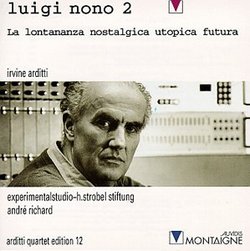| All Artists: Irvine Arditti, Andre Richard Title: Luigi Nono 2: La Lontananza Nostalgica Utopica Futura (1988-89) - Irvine Arditti Members Wishing: 2 Total Copies: 0 Label: Disques Montaigne Release Date: 4/26/2000 Album Type: Import Genre: Classical Styles: Chamber Music, Historical Periods, Classical (c.1770-1830) Number of Discs: 1 SwapaCD Credits: 1 UPCs: 093046936211, 093046936921, 3298497820042, 3383007820015, 3383007820046 |
Search - Irvine Arditti, Andre Richard :: Luigi Nono 2: La Lontananza Nostalgica Utopica Futura (1988-89) - Irvine Arditti
 | Irvine Arditti, Andre Richard Luigi Nono 2: La Lontananza Nostalgica Utopica Futura (1988-89) - Irvine Arditti Genre: Classical
La lontananza nostalgica utopica futura is a piece for violin with an eight-channel tape consisting of Gidon Kremer's violin playing and noises from the studio, with some sounds left untreated and others modified electroni... more » |
Larger Image |
CD DetailsSynopsis
Amazon.com La lontananza nostalgica utopica futura is a piece for violin with an eight-channel tape consisting of Gidon Kremer's violin playing and noises from the studio, with some sounds left untreated and others modified electronically. The violinist and tape projectionist interact in various ways, rendering each performance unique. Here, Irvine Arditti delivers a brilliant and loving hour-long performance, incorporating all but one minute of the prerecorded tape. Though Gidon Kremer is the work's dedicatee, he uses only 39 minutes of the piece for his Deutsche Grammophon recording. If you must choose only one version, go for Arditti's Montaigne rendering. --Robert Reigle Similar CDs
|
CD ReviewsNot entirely Nonoesque,the processed violin sounds like flys THE BLUEMAHLER | 04/08/1999 (3 out of 5 stars) "Nono's final creative period was like beginning again. At the Experimentalstudio-H.Strobel in Freiburg he had retreated from the concert hall for an intense engagement with sound. He became a master craftsman at live electronics, a realm few would touch. In this piece Nono worked with the remarkable violinist Gidon Kremer. Kremer had pre-recorded Nono's musical ideas, and these were soft,delicate yet ugly sounding ideas inhabiting the extreme registers of the violin,much playing at the bridge, a nasal-like sound, attacked double-stops. Nono thought of many voices for this work, "Madrigals" he called it The premise here is straight-forward, a dialogue between a live violinist,and a technician who manipulates the prerecorded materials. I found this piece within Nono's final oeurve weak and uninspired. The prerecorded material doesn't have the haunted,ethereal, otherwordly qualities as we fine quite powerfully in his other music"Guai ai gelidi mostri" for example. The violinist materials are placed on six different music stands with 8 speakers on the audiences right and left, 4 on each side. The violinist freely chooses which stand he will play from. Here Irving Arditti does all the right things, plays all the right notes, reveals his formidable extended technique, but the musical edifice doesn't amount to much. I can't help hearing (forgive me Luigi) mosquitoes and Hollywood-like processed strings." A grappling work THE BLUEMAHLER | 01/02/2008 (4 out of 5 stars) "Nono struggled greatly with " La lontananza nostalgica utopica futura ", literally delivering it on the eleventh hour to Gidon Kremer.
The composer expressed doubt about the pre-recorded material and his ability to communicate an almost inexpressible spirituality. Later, he expanded it's title and lengthened the work by about twenty minutes. Kremer uses the earlier, shorter version and there's little doubt that is a more extrovert performance. Arditti uses the revised,longer version and,frankly, there's both pluses and minuses. While Kremer's star soloist version revels in brazen colors, the Arditti begins with a piercing silver which shrieks, then dies, only to re-emerge as a whispering white. There's a truer sense of the work's madrigal quality here and a more pronounced realization of a wanderer's pathless travel. While Arditti delivers a typically gutsy,thorny, bravo performance (with partnered sound projectionist Andre Richard delivering an equally zealous interpretation) there is,on first listen and in comparison to Kremer, reduced contrast and sagging tension,thus minimizing it's accessibility. On repeated listens, it becomes apparent the Arditti/Richard team is meticulous in realizing Nono's wishes. Struggling with this work is part of it's inevitable reward and this performance demands a focused concentration. The Kremer version remains the ideal introductory work, while the Arditti/Richard performance is the next plateau and is an absolutely essential alternative. " |

 Track Listings (6) - Disc #1
Track Listings (6) - Disc #1

